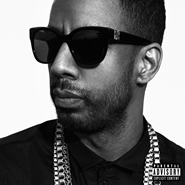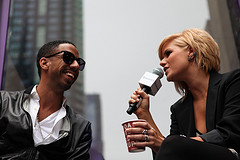Ryan Leslie Bets on Community, Moving Beyond Passive Social Media Followers
 “Can’t touch me, the community loves me.”
“Can’t touch me, the community loves me.”
– Ryan Leslie, Carnival of Venice
Back when I wrote Managing Online Forums, one of the people I reached out to for advance praise in late 2007 was Ryan Leslie.
This wasn’t some blanket spam request. I asked around 17 specific people and of that 17, 14 provided praise. I had reasons for contacting these individuals. At least as far back as 2006, I had been following Ryan’s work and was impressed by him, his background and his entrepreneurial spirit. He’s a uniquely smart, talented guy and I felt that he was on the way to even greater heights. When he agreed to read the book and then provide a blurb for me, I was honored.
And he has only become bigger, more successful and more well known. A year after I released my book, he put out his first album as a performer. He released Black Mozart, his fourth album, yesterday. I’ll always be grateful for his praise of my book and I own at least one copy of each of his albums. To support him, but also because I love his work. It fills my playlist.
Of all of the artists I could have reached out to, what drew me to Ryan is that he was on the right path community wise and demonstrated an aptitude that others lacked. I didn’t just want the CEO of a Fortune 500 or some random pop star – I wanted someone with a mind for online community building. Ryan’s latest project really re-enforces this.
#Renegades
On April 22, I received a message care of an email list I had subscribed to, in order to stay informed of Ryan’s latest work. It was an invitation to join the #Renegades club. He described it as “a private social media club I’m starting exclusively for fans who have actually bought something from me and don’t just follow on Twitter and Instagram.” It was $12 to become an active member and that $12 was essentially a pre-order of Black Mozart, which was released more than 4 months later. I joined the club without hesitation. I love the album and I’m listening to it as I write this article.
According to interviews that he’s given, Ryan wanted a way to offer more than just generic promotional messages to the people who actually support him by buying his records and going to his shows. You might have a million followers on Twitter, but what’s it worth if only 500 people buy your album? He wanted to offer those 500 people more – to offer them access, in order to express his appreciation and build deeper connections. That’s what community is all about.
When I say access, I don’t just mean behind the scenes footage. He has posted a phone number and an email address and if you call, text or email him, he routinely responds.
So rather than just having over 550,000 followers on Twitter, he has more than 4,000 who paid him for his album directly, creating a direct relationship that he can maintain. This is why Black Mozart won’t be on iTunes.
“I chose to take myself off of iTunes because there was too much anonymity happening in my career,” he told Felicia Megan Gordon. “Let’s say seven thousand records were sold digitally in the last three months, and if I want to reach out and just say, ‘Hey guys, because you bought my album, I’m actually able to tour this year,’ I can’t even do that. So my goal around the Black Mozart project is: first of all, people are going to bootleg this record. The minute it’s digital, it’s free. Folks that still support it, despite the fact that they can get it for free, those are the people I’m concerned with, those are the people who are enabling and empowering me to continue to create. I think more artists should be thanking the people who support them. They’d probably have longer careers.”
The Unfortunate Truth About Follower and Like Counts
One of the things I find really interesting is how honest Ryan is about how Twitter follower counts, Facebook like counts and similar metrics don’t necessarily translate to much.
“Up until two months ago, I did not believe in [Instagram, Facebook and Twitter],” he said in the interview with Gordon. “I wasn’t getting the results I wanted from any of them. I was looking at my numbers. I had 550,000 Twitter followers and eight retweets. Or if I had something pseudo profound to say, a hundred-plus retweets. And I’m like, ‘There’s no way that this is engaging. There’s no way that this is effective. There’s no way that this is a good use of my time.’ It was valuable to Twitter.”
The message Ryan has isn’t that you should leave these platforms – he certainly hasn’t – but he’s saying something that people always need to be reminded of: third party social media platforms are outposts (a term coined by Chris Brogan). You maintain a presence there, you provide some value there, but the idea is to build strong connections where people choose to engage with you directly and not through some third party intermediary like Facebook and Twitter.
That’s the real power of community. Not that you have a bunch of people who might never see a word that you see, but that you have a group that cares enough to follow you wherever you do what you do.
“If you have a bunch of passive followers on Twitter, a bunch of passive subscribers on YouTube, a bunch of passive followers on Instagram, a bunch of worthless likes on Facebook, the bottom line is those social media channels should really be used to create a real and meaningful connection with everyone single person that is supporting you,” Ryan told Soul Train. “I don’t care who you are, you need a support system. In fact, social media is a very weak support system and almost an artificial ego booster in terms of follow/notifications numbers.”
“For artists, while those numbers may be an indicator of interest, they are far from indicators of real support. So in order to keep the social media fresh, I can’t tell you how many people who send me an email or a text message, and couldn’t believe that an artist actually cared enough to respond to someone that was supporting them. That is the future of music. That is how you keep social media fresh. Use social media as a channel to distribute information to the people on how they can actually contact you directly. You have the same tools of blocking folks when you have a direct line of communication, but that communication channel is infinitely more valuable than the passive ones that social media provides.”
Key Takeaways
There are several things that you can learn from Ryan. Here are a few of the important things to remember:
- Accumulation based metrics are nice and they mean something, but they aren’t the goal. The goal is engagement. Having a million Twitter followers is cool… having a million engaged Twitter followers to infinitely more cooler and beneficial. If your online community has 100,000 registered members, that’s awesome, but how many are active? I’ve had major celebrities share articles I’ve written, only for it to amount to a handful of clicks. Who is actively supporting you? Who cares about what you have to say? That’s who matters most.
- Don’t be afraid to focus on specific groups of people – especially those that support you genuinely. We all have to focus our attention. For Ryan, it’s focusing on the people who buy the album directly from him. For you, it might be something else. But understand who supports your art and express appreciation to them, not just in the generic sense, but also in a very specific, direct and one-on-one sense, as much as you can.
- It’s OK not to be everywhere. Ryan doesn’t want his album on iTunes. A lot of people would probably tell him that is a bad strategy. It doesn’t matter. For him, it’s good because it is helping him to accomplish his goal of being more deeply connected with the people who support him. He’d rather have 4,000 people buy his album directly from him, than have X number buy it through iTunes, which leaves him with no way to connect with the people who bought it.
- Having outposts on third party platforms is a must, but don’t lose sight of the end game, which is to build relationships with people who will follow you, wherever you are – most importantly, to your own platform.

